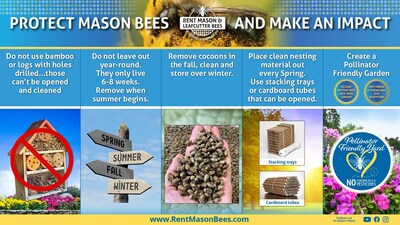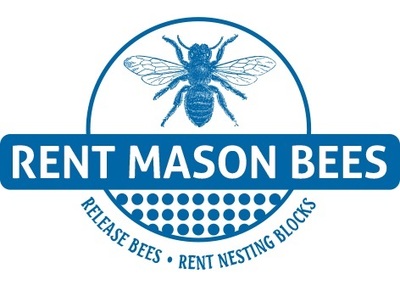Subjects: SVY, BFA, ENI, ANW
Neglected Bee Hotels Pose a Threat to Mason Bee Populations: A Fall Cleaning Initiative
BOTHELL, Wash., Nov. 2, 2023 /PRNewswire/ -- Rent Mason Bees, the largest solitary bee provider in the United States, collaborates with esteemed research teams and bee laboratories to study the growing threat from harmful predators to solitary bee populations. While millions of bee hotels are purchased each year, many lack the required care and maintenance, jeopardizing bee health. Researchers and industry leaders have observed a rise in predators and parasites, posing a significant threat to mason bee populations. Failing to address this issue could result in bee hotels becoming infested by these predators, endangering mason bee populations.
Thyra McKelvie, a Pollination Program Educator for Rent Mason Bees, points out that many individuals are using inappropriate nesting materials for mason bees and are leaving them out year-round. She emphasizes that the traditional method of using logs with holes drilled in them for nesting material is no longer suitable, and a change is necessary to properly care for mason bees. She offers four essential steps for proper care of mason bees:
- Use Nesting Material That Can Be Opened: Avoid materials like bamboo or drilled logs, which encourage predator infestations. Instead, opt for materials that can be easily opened and cleaned.
- Nesting Material Does NOT Stay Out Year-Round: Mason bees have a short lifespan of 6-8 weeks, requiring the removal of nesting material at the end of spring to prevent predator infiltration.
- Fall Cleaning and Predator Elimination: Fall maintenance is critical. Remove cocoons from the bee hotel, clean thoroughly, and eliminate invasive predators. Watch how to clean https://youtu.be/9_1WlEDTyhk?si=ccEcx152zV2JmhpO
- Provide Fresh Nesting Material Annually: Ensure a fresh, uncontaminated supply of nesting material each spring.
Entomologist Abigail Lehner, from UC Davis in the Williams Lab, has observed an increase in invasive parasites as a result of her studies. She points out, "Houdini flies and pollen mites are prevalent parasites we encounter in mason bee hotels. The only way to reduce the risk is to perform an annual cleaning and sterilization of the cocoons and bee houses."
WHAT IS A SOLITARY MASON BEE?
Mason bees are nature's most productive pollinators, visiting over 2,000 blossoms daily. Their distinctive "belly-flopping" technique enables them to gather loose pollen across their bodies, resulting in an impressive 95% pollination rate compared to their honeybee cousins 5% rate. These gentle, non-stinging bees live and work independently, without producing honey or residing in hives. Their self-sufficiency makes them non-aggressive and incredibly easy to care for.
Watch this short video 'Life Cycle of a Mason Bee & How You Can Make an Impact' - A two-year journey using a macro lens. Be Inspired and Take Action! https://youtu.be/7JLquOZdtwU?si=6kSNcDb9KT_R04fc
This is a call to action to become advocates for mason bee populations by transforming the way we establish and maintain their nesting sites. Let's preserve these invaluable pollinators, one bee hotel at a time.
About
Rent Mason Bees offers solitary bees to backyard gardeners and farmers. They are dedicated to educating and supporting solitary bee enthusiasts and focus on solitary bee conservation through collaboration with research teams and bee laboratories to combat the threat of harmful predators. With their program, you can release solitary bees and rent nesting blocks, all of which they clean and maintain. Join them in creating a more vibrant and sustainable garden ecosystem while securing the future of solitary bees and our environment.
SOURCE Rent Mason Bees
These press releases may also interest you
|
News published on and distributed by:





